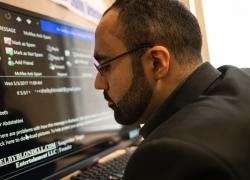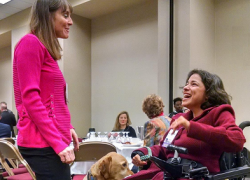Bob Simonovich was in the Army for 14 years. Transitioning out of the military and finding a civilian job was difficult, especially with a traumatic brain injury and PTSD. An employment specialist with the VA Medical Center in Cleveland met with Bob to go through a process called “discovery” that helped him look at his job search differently. Based on his strengths, interests and talents, the discovery process led Bob to work that he is passionate about: “I discovered that I’m capable of doing a job that I’ve dreamed of all my life.” For Bob, that job is an official scorer for the Akron RubberDucks minor league baseball team.
This process of discovery, which matches people’s skills, interests and talents with employers’ needs, results in employment that is “customized” for both the jobseeker and the employer, creating a “win-win” relationship. Known as customized employment, thousands of people with disabilities have benefitted from it in the past 22 years following the Supreme Court’s decision in Olmstead v. L.C. This landmark case affirmed the rights of people with disabilities to live and receive services in their communities in the most integrated settings possible. This includes employment services since working is a key part of community life.
Two years later came another major milestone – the establishment of the Office of Disability Employment Policy. Since day one, ODEP has worked to advance the spirit of Olmstead through our work on customized employment, grounded in the belief that everyone can bring value and contribute to an organization through employment.
Early on, we implemented multiple rounds of Customized Employment Grants to help states and the workforce development system use this strategy to assist job seekers with disabilities. We also implemented Workforce Action Grants, also known as Olmstead employment grants, to enable people transitioning out of nursing homes and institutions to seek community-based employment.
Based on lessons learned, we then worked with national leaders in the disability employment field to develop numerous resources, including profiles of customized employment in action and a competency model describing the skills needed to provide it effectively. At the heart of customized employment is discovery, an individualized assessment process which helps identify specific skills that an individual can offer employers. To this end, we also developed multiple resources on discovery targeted to different audiences, including youth, adults, veterans and even a self-guided manual, so that some people can take themselves through the process.
In 2014, the Workforce Innovation and Opportunity Act affirmed the importance of customized employment by defining it, for the first time, in federal law. That year, we also developed three videos on customized employment to help others understand its benefits. Since then, we have collaborated with the Rehabilitation Services Administration to develop their fact sheet, “The Essential Elements of Customized Employment,” which explains how to provide customized employment through the vocational rehabilitation system. And recently we partnered with the Veterans Health Administration to implement targeted trainings for their job development staff, and developed a brief and videos about customized employment (see the first three resources listed on the linked webpage) as a strategy for assisting veterans with disabilities like Bob.
At ODEP, we’re proud to have played a role in advancing customized employment as a strategy to help people, like Bob and so many others, find fulfilling jobs. We also look forward to working with our many partners – including multiple federal agencies whose systems now support this evidence-based policy – over the next 20 years and beyond to further open the door to community life by making sure that customized employment is a tool in the toolbox of employment strategies.
Rose Warner is a senior policy advisor in the department’s Office of Disability Employment Policy.

 U.S. Department of Labor Blog
U.S. Department of Labor Blog



